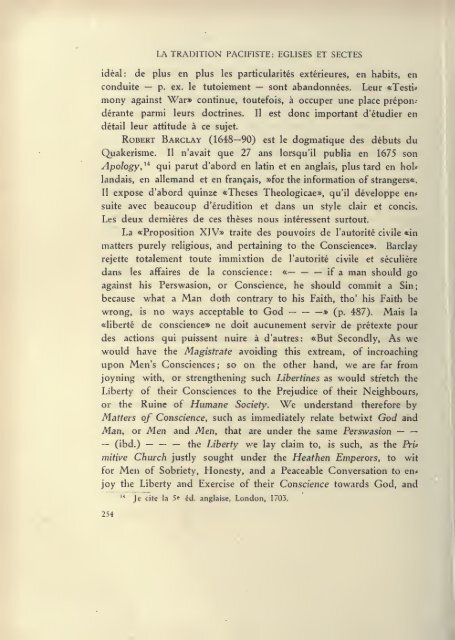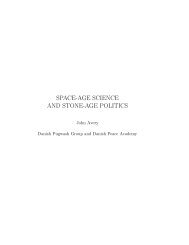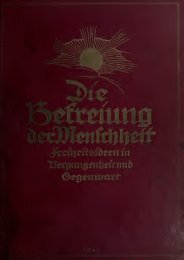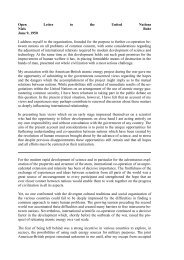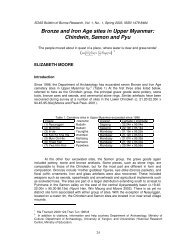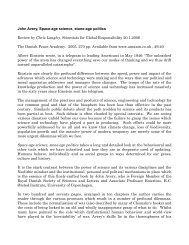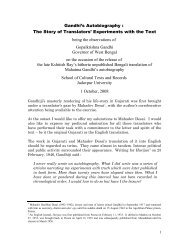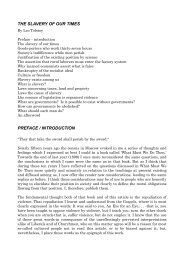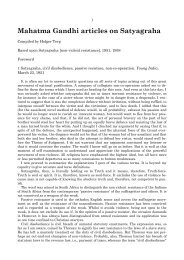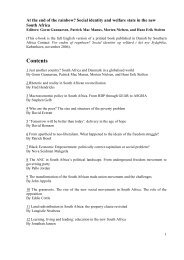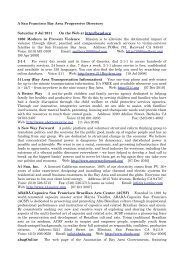- Page 7:
HISTOIRE DE L'INTERNATIONALISME
- Page 11 and 12:
HISTOIRE DE L'INTERNATIONALISME PAR
- Page 13:
A ma femme
- Page 16 and 17:
exclusivement; ou bien ils n'avaien
- Page 19 and 20:
TABLE ANALYTIQUE Préface p. IX Int
- Page 21:
§ 3. Allgemeine und General Reform
- Page 24 and 25:
INTRODUCTION savoir si ces instinct
- Page 26 and 27:
INTRODUCTIOM sociaux. La philosophi
- Page 28 and 29:
INTRODUCTION eux, de leurs oppositi
- Page 30 and 31:
INTRODUCTION La guerre et la civili
- Page 32 and 33:
INTRODUCTION en même temps unité
- Page 34 and 35:
INTRODUCTION qui déterminent l'iss
- Page 36 and 37:
INTRODUCTION mique : il voit dans l
- Page 38 and 39:
INTRODUCTION travail intellectuel.
- Page 40 and 41:
NOTICE BIBLIOGRAPHIQUE précieuse d
- Page 42 and 43:
ANTIQUITÉ On ne trouve pas chez eu
- Page 44 and 45:
ANTIQUITÉ de l'Occident, la domina
- Page 46 and 47:
ANTIQUITÉ familière à la pensée
- Page 48 and 49:
ANTIQUITÉ entre états. Il faut no
- Page 50 and 51:
ANTIQUITÉ on trouve des idées hum
- Page 52 and 53:
ANTIQUITÉ hommes, dans laquelle no
- Page 54 and 55:
ANTIQUITÉ Chez Epictète (env. 100
- Page 56 and 57:
ANTIQUITÉ pour l'Antiquité en gé
- Page 58 and 59:
CHRISTIANISME humains; par conséqu
- Page 60 and 61:
CHRISTIANISME problème. On n'est p
- Page 62 and 63:
CHRISTIANISME monde. Pourtant, apr
- Page 64 and 65:
CHRISTIANISME Frères ne doivent re
- Page 66 and 67:
CHRISTIANISME ait ordonné la guerr
- Page 68 and 69:
CHRISTIANISME commande la guerre po
- Page 70 and 71:
CHRISTIANISME surtout un fait inté
- Page 72 and 73:
CHRISTIANISME c'est leur conviction
- Page 74 and 75:
CHRISTIANISME en principe les exéc
- Page 76 and 77:
CHRISTIANISME de l'Eglise, affirmen
- Page 78 and 79:
CHRISTIANISME cette conclusion que
- Page 80 and 81:
CHRISTIANISME MoRAVES, qui sont ant
- Page 82 and 83:
CHRISTIANISME C'est dans la partie
- Page 84 and 85:
CHRISTIANISME On ne peut pas demand
- Page 86 and 87:
CHRISTIANISME conçue: «que l'homi
- Page 88 and 89:
CHRISTIANISME en est de même des H
- Page 90 and 91:
EMPIRE ET PAPAUTÉ ont trouvé dans
- Page 92 and 93:
EMPIRE ET PAPAUTÉ a plané devant
- Page 94 and 95:
EMPIRE ET PAPAUTÉ immédiatement d
- Page 96 and 97:
EMPIRE ET PAPAUTÉ «Si l'on fait o
- Page 98 and 99:
EMPIRE ET PAPAUTÉ n'est pas celle
- Page 100 and 101:
EMPIRE ET PAPAUTÉ § 4. - PAPAUTÉ
- Page 102 and 103:
EMPIRE ET PAPAUTÉ l'idée internat
- Page 104 and 105:
EMPIRE ET PAPAUTÉ les fidèles. Id
- Page 106 and 107:
EMPIRE ET PAPAUTÉ cette principaut
- Page 108 and 109:
CHAPITRE IV LES PRÉCTJKc^^rTi^s DE
- Page 110 and 111:
LES PRÉCURSEURS DE L'INTERNATIONAL
- Page 112 and 113:
LES PRÉCURSEURS DE L'INTERNATIONAL
- Page 114 and 115:
LES PRÉCURSEURS DE L'INTERNATIONAL
- Page 116 and 117:
LES PRÉCURSEURS DE L'INTERNATIONAL
- Page 118 and 119:
LES PRÉCURSEURS DE L'INTERNATIONAL
- Page 120 and 121:
LES PRÉCURSEURS DE L'INTERNATIONAL
- Page 122 and 123:
LES PRÉCURSEURS DE L'INTERNATIONAL
- Page 124 and 125:
LES PRÉCURSEURS DE L'INTERNATIONAL
- Page 126 and 127:
LES PRÉCURSEURS DE L'INTERNATIONAL
- Page 128 and 129:
LES PRÉCURSEURS DE L'INTERNATIONAL
- Page 130 and 131:
LES PRÉCURSEURS DE L'INTERNATIONAL
- Page 132 and 133:
LES PRÉCURSEURS DE L'INTERNATIONAL
- Page 134 and 135:
LES PRÉCURSEURS DE L'INTERNATIONAL
- Page 136 and 137:
LES PRÉCURSEURS DE L'INTERNATIONAL
- Page 138 and 139:
LES PRÉCURSEURS DE L'INTERNATIONAL
- Page 140 and 141:
LES PRÉCURSEURS DE L'INTERNATIONAL
- Page 142 and 143:
LES PRÉCURSEURS DE L'INTERNATIONAL
- Page 144 and 145:
LES PRÉCURSEURS DE L'INTERNATIONAL
- Page 146 and 147:
LES PRÉCURSEURS DE L'INTERNATIONAL
- Page 148 and 149:
LES PRÉCURSEURS DE L'INTERNATIONAL
- Page 150 and 151:
' LES PRÉCURSEURS t)E L'INTERNATIO
- Page 152 and 153:
LES PRÉCURSEURS DE L'INTERNATIONAL
- Page 154 and 155:
TRANSITION AUX TEMPS MODERNES rappo
- Page 156 and 157:
TRANSITION AUX TEMPS MODERNES princ
- Page 158 and 159:
TRANSITION AUX TEMPS MODERNES L'Hum
- Page 160 and 161:
TRANSITION AUX TEMPS MODERNES Il é
- Page 162 and 163:
TRANSITION AUX TEMPS MODERNES les p
- Page 164 and 165:
TRANSITION AUX TEMPS MODERNES sion
- Page 166 and 167:
TRANSITION AUX TEMPS MODERNES la so
- Page 168 and 169:
CHAPITRE VI LA TRADITION PACIFISTE
- Page 170 and 171:
LA TRADITION PACIFISTE: L'HUMANISME
- Page 172 and 173:
LA TRADITION PACIFISTE: LHUMANISME
- Page 174 and 175:
LA TRADITION PACIFISTE; I. HUMANISM
- Page 176 and 177:
LA TRADITION PACIFISTE: L'HUMANISME
- Page 178 and 179:
LA TRADITION PACIFISTE: L'HUMANISME
- Page 180 and 181:
LA TRADITION PACIFISTE: L'HUMANISME
- Page 182 and 183:
LA TRADITION PACIFISTE : L'HUMANISM
- Page 184 and 185:
LA TRADITION PACIFISTE: L'HUMANISME
- Page 186 and 187:
LA TRADITION PACIFISTE: L HUMANISME
- Page 188 and 189:
LA TRADITION PACIFISTE: L'HUMANISME
- Page 190 and 191:
LA TRADITION PACIFISTE: L'HUMANISME
- Page 192 and 193:
LA TRADITION PACIFISTE: L'HUMANISME
- Page 194 and 195:
LA TRADITION PACIFISTE: L'HUMANISME
- Page 196 and 197:
LA TRADITION PACIFISTE: L'HUMANISMK
- Page 198 and 199:
LA TRADITION PACIFISTE: L'HUMANISME
- Page 200 and 201:
LA TRADITION PACIFISTE: L'HUMANISME
- Page 202 and 203:
LA TRADITION PACIFISTE: L'HUMANISME
- Page 204 and 205:
LA TRADITION PACIFISTE: L'HUMANISME
- Page 206 and 207:
LA TRADITION PACIFISTE: L'HUMANISMl
- Page 208 and 209:
LA TRADITION PACIFISTE: L'HUMANISME
- Page 210 and 211:
LA TRADITION PACIFISTE: L'HUMANISME
- Page 212 and 213:
LA TRADITION PACIFISTE: L'HUMANISME
- Page 214 and 215:
LA TRADITION PACIFISTE: L'HUMANISME
- Page 216 and 217:
LA TRADITION PACIFISTE: L'HUMANISMK
- Page 218 and 219:
LA TRADITION PACIFISTE: L'HUMANISME
- Page 220 and 221:
LA TRADITION PACIFISTE: L'HUMANISME
- Page 222 and 223:
LA TRADITION PACIFISTE: L'HUMANISME
- Page 224 and 225:
LA TRADITION PACIFISTE: L'HUMANISME
- Page 226 and 227: LA TRADITION PACIFISTE: L'HUMANISME
- Page 228 and 229: LA TRADITION PACIFISTE: L'HUMANISME
- Page 230 and 231: LA TRADITION PACIFISTE: L'HUMANISME
- Page 232 and 233: LA TRADITION PACIFISTE: L'HUMANISME
- Page 234 and 235: LA TRADITION PACIFISTE: L'HUMANISME
- Page 236 and 237: LA TRADITION PACIFISTE: L'HUMANISME
- Page 238 and 239: LA TRADITION PACIFISTE: EGLISES ET
- Page 240 and 241: LA TRADITION PACIFISTE: EGLISES ET
- Page 242 and 243: LA TRADITION PACIFISTE: EGLISES ET
- Page 244 and 245: LA TRADITION PACIFISTE: EGLISES ET
- Page 246 and 247: LA TRADITION PACIFISTE: EGLISES ET
- Page 248 and 249: LA TRADITION PACIFISTE : EGLISES ET
- Page 250 and 251: LA TRADITION PACIFISTE: EGLISES ET
- Page 252 and 253: LA TRADITION PACIFISTE: EGLISES ET
- Page 254 and 255: LA TRADITION PACIFISTE: EGLISES ET
- Page 256 and 257: LA TRADITION PACIFISTE: EGLISES ET
- Page 258 and 259: LA TRADITION PACIFISTE: KGI.ISES ET
- Page 260 and 261: LA TRADITION PACIFISTE: EGLISES ET
- Page 262 and 263: I.A TRADITION PACIFISTE: EGLISES ET
- Page 264 and 265: LA TRADITION PACIFISTE: EGLISES ET
- Page 266 and 267: LA TRADITION PACIFISTE: EGLISES ET
- Page 268 and 269: I.A TRADITION PACIFISTE: EGLISES ET
- Page 270 and 271: LA TRADITION PACIFISTE: EGLISES ET
- Page 272 and 273: LA TRADITION PACIFISTE: EGLISES ET
- Page 274 and 275: LA TRADITION PACIFISTE: EGLISES ET
- Page 278 and 279: LA TRADITION PACIFISTE: EGLISES ET
- Page 280 and 281: LA TRADITION PACIFISTE: EGLISES ET
- Page 282 and 283: LA TRADITION PACIFISTE: EGLISES ET
- Page 284 and 285: CHAPITRE VIII LA SCIENCE DE DROIT I
- Page 286 and 287: LA SCIENCE DE DROIT INTERNATIONAL t
- Page 288 and 289: LA SCIENCE DE DROIT INTERNATIONAL d
- Page 290 and 291: LA SCIENCE DE DROIT INTERNATIONAL N
- Page 292 and 293: LA SCIENCE DE DROIT INTERNATIONAL F
- Page 294 and 295: LA SCIENCE DE DROIT INTERNATIONAL F
- Page 296 and 297: LA SCIENCE DE DROIT INTERNATIONAL C
- Page 298 and 299: LA SCIENCE DH DROIT INTERNATIONAL F
- Page 300 and 301: LA SCIENCE DE DROIT INTERNATIONAL d
- Page 302 and 303: LA SCIENCK DE DROIT INTERNATIONAL s
- Page 304 and 305: LA SCIENCE DE DROIT INTERNATIONAL c
- Page 306 and 307: LA SCIENCE DE DROIT INTERNATIONAL f
- Page 308 and 309: LA SCIENCE DE DROIT INTERNATIONAL g
- Page 310 and 311: LA SCIENCE DE DROIT INTERNATIONAL p
- Page 312 and 313: LA SCIENCE DE DROIT INTERNATIONAL L
- Page 314 and 315: LA SCIENCE DE DROIT INTERNATIONAL c
- Page 316 and 317: LA SCIENCE DE DROIT INTERNATIONAL q
- Page 318 and 319: LA SCIENCE DE DROIT INTERNATIONAL p
- Page 320 and 321: LA SCIENCE DE DROIT INTERNATIONAL O
- Page 322 and 323: LA SCIENCK DE DROIT INTERNATIONAL o
- Page 324 and 325: LA SCIENCE DE DROIT INTERNATIONAL E
- Page 326 and 327:
LA SCIENCE DE DROIT INTERNATIONAL p
- Page 328 and 329:
LA SCIENCE DE DROIT INTERNATIONAL
- Page 330 and 331:
LA SCIENCE DE DROIT INTERNATIONAL q
- Page 332 and 333:
LA SCIENCE DE DROIT INTERNATIONAL t
- Page 334 and 335:
LA SCIENCE DE DROIT INTERNATIONAL e
- Page 336 and 337:
LA SCIENCE DE DROIT INTERNATIONAL d
- Page 338 and 339:
LA SCIENCE DE DROIT INTERNATIONAL n
- Page 340 and 341:
LA SCIENCE DE DROIT INTERNATIONAL e
- Page 342 and 343:
LA SCIENCE DE DROIT INTERNATIONAL l
- Page 344 and 345:
La science de droit international q
- Page 346 and 347:
LA SCIENCE DE DROIT INTERNATIONAL C
- Page 348 and 349:
CHAPITRE IX DÉBUTS DE LA LITTÉRAT
- Page 350 and 351:
DÉBUTS DE LA LITTÉRATURE PACIFIST
- Page 352 and 353:
DÉBUTS DE LA LITTÉRATURIi PACIFIS
- Page 354 and 355:
leurs les plus vives: «. . . • a
- Page 356 and 357:
DÉBUTS DE LA LITTÉRATURE PACIFIST
- Page 358 and 359:
DÉBUTS DE LA LITTÉRATURE PACIFIST
- Page 360 and 361:
DÉBUTS DE LA LITTÉRATURE PACIFIST
- Page 362 and 363:
DÉBUTS DE LA LITTÉRATURE PACIFIST
- Page 364 and 365:
DÉBUTS DE LA LITTÉRATURE PACIFIST
- Page 366 and 367:
DÉBUTS DE LA LITTÉRATURE PACIFIST
- Page 368 and 369:
DÉBUTS DE LA LITTÉRATURE PACIFIST
- Page 370 and 371:
DÉBUTS DE LA LITTÉRATURK PACIFIST
- Page 372 and 373:
DÉBUTS DE LA LITTÉRATURE PACIFIST
- Page 374 and 375:
DÉBUTS DE LA LITTÉRATURE PACIFIST
- Page 376 and 377:
DÉBUTS DE LA LITTÉRATURE PACIFIST
- Page 378 and 379:
DÉBUTS DE LA LITTÉRATURE PACIFIST
- Page 380 and 381:
DÉBUTS DE LA LITTÉRATURE PACIFIST
- Page 382 and 383:
DÉBUTS DE LA LITTÉRATURE PACIFIST
- Page 384 and 385:
DÉBUTS DE LA LITTÉRATURE PACIFIST
- Page 386 and 387:
et autre part: DÉBUTS DE LA LITTÉ
- Page 388 and 389:
DÉBUTS DE LA LITTÉRATURE PACIFIST
- Page 390 and 391:
DÉBUTS DE LA LITTÉRATURE PACIFIST
- Page 392 and 393:
DÉBUTS DE LA LITTÉRATURE PACIFIST
- Page 394 and 395:
CHAPITRE X LE PROBLÈME D'UNE ORGAN
- Page 396 and 397:
LE PROBLÈME D'UNE ORGANISATION INT
- Page 398 and 399:
LE PROBLÈME D'UNE ORGANISATION INT
- Page 400 and 401:
LE PROBLÈME D'UNE ORGANISATION INT
- Page 402 and 403:
LE PROBLÈME D'UNE ORGANISATION INT
- Page 404 and 405:
LE PROBLÈME D'UNE ORGANISATION INT
- Page 406 and 407:
LE PROBLÈME D'UNE ORGANISATION INT
- Page 408 and 409:
LE PROBLÈME D'UNE ORGANISATION INT
- Page 410 and 411:
LE PROBLÈME D'UNE ORGANISATION INT
- Page 412 and 413:
LE PROBLÈME DUNE ORGANISATION INTE
- Page 414 and 415:
LE PROBLÈME D'UNE ORGANISATION INT
- Page 416 and 417:
LE PROBLÈME D'UNE ORGANISATION INT
- Page 418 and 419:
LE PROBLÈME D'UNE ORGANISATION INT
- Page 420 and 421:
LE PROBLÈME D'UNE ORGANISATION INT
- Page 422 and 423:
LE PROBLÈME DUNE ORGANISATION INTE
- Page 424 and 425:
LE PROBLÈME D'UNE ORGANISATION INT
- Page 426 and 427:
LE PROBLÈME D'UNE ORGANISATION INT
- Page 428 and 429:
LE PROBLÈME D'UNE ORGANISATION INT
- Page 430 and 431:
LE PROBLÊME D'UNE ORGANISATION INT
- Page 432 and 433:
LE PROBLÈME DUNE ORGANISATION INTE
- Page 434 and 435:
LE PROBLÈME DUNE ORGANISATION INTE
- Page 436 and 437:
LE PROBLÈME DUNE ORGANISATION INTE
- Page 438 and 439:
LE PROBLÈME DUNE ORGANISATION INTE
- Page 440 and 441:
LE PROBLÈME D'UNE ORGANISATION INT
- Page 442 and 443:
LE PROBLÈME D'UNE ORGANISATION INT
- Page 444 and 445:
LE PROBLÈME DUNE ORGANISATION INTE
- Page 446 and 447:
LE PROBLÈME D'UNE ORGANISATION INT
- Page 448 and 449:
LE PROBLÈME D'UNE ORGANISATION INT
- Page 450 and 451:
LE PR0BLÎ-:ME D'UNE ORGANISATION I
- Page 452 and 453:
LE PROBLÊME DUNE ORGANISATION INTE
- Page 454 and 455:
LE PROBLÈME D'UNE ORGANISATION INT
- Page 456 and 457:
LE PROBLÈME D'UNE ORGANISATION INT
- Page 458 and 459:
LE PROBLÈME D'UNE ORGANISATION INT
- Page 460 and 461:
LE PROBLÈME D'UNE ORGANISATION INT
- Page 462 and 463:
LE PROBLÈME D'UNE ORGANISATION INT
- Page 464 and 465:
LE PROBLÈME D'UNE ORGANISATION INT
- Page 466 and 467:
LE PROBLÈME DUNE ORGANISATION INTE
- Page 468 and 469:
LE PROBLÈME D'UNE ORGANISATION INT
- Page 470 and 471:
LE PROBLÈME DUNE ORGANISATION INTE
- Page 472 and 473:
LE PROBLÈME D'UNE ORGANISATION INT
- Page 474 and 475:
LE PROBLÈME D'UNE ORGANISATION INT
- Page 476 and 477:
LE PROBLÈME D'UNE ORGANISATION INT
- Page 478 and 479:
LE PROBLÈME D'UNE ORGANISATION INT
- Page 480 and 481:
LE PROBLEME D'UNE ORGANISATION INTE
- Page 482 and 483:
LE PROBLf^ME D'UNE ORGANISATION INT
- Page 484 and 485:
LE PROBLÈME D'UNE ORGANISATION INT
- Page 486 and 487:
LE PROBLÈME D UNE ORGANISATION INT
- Page 488 and 489:
LE PROBLÈME D'UNE ORGANISATION INT
- Page 490 and 491:
LE PROBLÈME D'UNE ORGANISATION INT
- Page 492 and 493:
LE PROBLÈME DUNE ORGANISATION INTE
- Page 494 and 495:
LE PROBLÈME D'UNE ORGANISATION INT
- Page 496 and 497:
LE PROBLÈME D'UNE ORGANISATION INT
- Page 498 and 499:
LE PROBLÈME D'UNE ORGANISATION INT
- Page 500 and 501:
HUMANITARISME RELIGIEUX ET SENTIMEN
- Page 502 and 503:
HUMANITARISME RELIGIEUX ET SENTIMEN
- Page 504 and 505:
HUMANITARISME RELIGIEUX ET SENTIMEN
- Page 506 and 507:
HUMANITARISME RELIGIEUX ET SENTIMEN
- Page 508 and 509:
HUMANITARISME RELIGIEUX ET SENTIMEN
- Page 510 and 511:
HUMANITARISME RELIGIEUX ET SENTIMEN
- Page 512 and 513:
HUMANITARISME RELIGIEUX ET SENTIMEN
- Page 514 and 515:
TRAITÉS DE WESTPHALIE — CONCLUSI
- Page 516 and 517:
TRAITÉS DE WESTPHALIE - CONCLUSION
- Page 518 and 519:
TRAITÉS DE WESTPHALIE - CONCLUSION
- Page 520 and 521:
TRAITÉS DE WESTPHAUE - CONCLUSION
- Page 523 and 524:
OUVRAGES CITÉS (Les chiffres renvo
- Page 525 and 526:
OUVRAGES CITÉS Erasmus (Desiderius
- Page 527 and 528:
OUVRAGES CITÉS MoiTESEN (L.), Folk
- Page 529 and 530:
Académies, 349—51 ; chez Corne»
- Page 531 and 532:
tianistne; 189; légitimité de la
- Page 533 and 534:
ois, 98 ss ; Georges Podiebrad, llO
- Page 535 and 536:
Innocent III, 79. Instruction d'un
- Page 537 and 538:
influence de la Réforme, 139— 40
- Page 539:
Thucydide, sur l'arbitrage, 26—27
- Page 547:
HANDBOUND AT TIΠUNUIRSin' OF TORO


